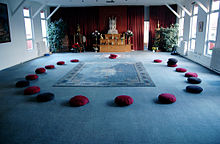Amaravati Buddhist Monastery
It is not to be confused with the ancient Amaravati Stupa in India.
Community
The resident community consists of monks (bhikkhus), nuns (siladhara), and male and female postulants who live in accordance with strict traditional codes of celibacy, together with a volunteer support staff and visitors. According to the monastery website, regarding the male monastic community, "Usually, there are between 15 and 25 bhikkhus and samaneras in residence, living a contemplative, celibate, mendicant life according to the Vinaya and Dhamma. [...] The community also consists of anagārikas, or white-robed postulants on the eight precepts, who after a year or two may be given samanera ordination." The monastery's order of siladhara, or ten-precept nuns, dates from 1983; there are 10 or so members and a number of female postulants at Amaravati and at Chithurst Buddhist Monastery in West Sussex.

Origins
Amaravati formally opened in 1985, the site having been purchased from Buckinghamshire County Council by the English Sangha Trust the year before. Its configuration of several large huts of Canadian cedar, built in extensive grounds for military purposes during World War II, had formerly been a residential school. A purpose-built temple was officially opened on 4 July 1999 by Princess Galyani Vadhana, sister of the King of Thailand. The monastery's founder and abbot for most of its existence has been Ajahn Sumedho, Ajahn Chah's foremost disciple in the West. In Autumn 2010 he handed over to the English monk Ajahn Amaro, who for the preceding 15 years had been co-abbot of Abhayagiri Monastery in Redwood Valley, California.
-
Beyond all coming and going: the Tathagata
-
Temple of Amaravati Monastery UK seen from within cloister
-
Main temple building seen from rear car park
-
Amaravati Monastery Cloister outside wall and temple in background
-
Main Stupa and trees in bloom at Amaravati Monastery UK
Outreach
Amaravati has sister monasteries in England – in Devon, Northumberland and West Sussex – as well as monasteries in New Zealand, Italy, Switzerland and North America, which were likewise founded by Ajahn Sumedho. These exist among other Western branches of Ajahn Chah's community, in addition to those in Thailand (see list below). A new vihara in Portugal, called Sumedharama, has been founded north west of Lisbon, near Ericeira. Amaravati's retreat centre provides meditation courses for lay people from April to December. A meditation workshop for lay visitors happens each Saturday from 2-4pm, and there are family and other practice and teaching events happening at the monastery regularly.
In accordance with the principle of dāna established by the Buddha, the monastery and the retreat centre are run entirely on donations. Amaravati is near the Hertfordshire village of Great Gaddesden. The nearest towns are Hemel Hempstead and Berkhamsted. The mediaeval convent of St Margaret's, abolished by Henry VIII during the Dissolution of the Monasteries, was for centuries just 400 yards along the lane. Amaravati in the ancient Buddhist language of Pali means "deathless realm."
Retreat Centre
The monastery includes a retreat centre offering monastic and lay retreats most of the year.
Long Term Plans
In 2013, plans were unveiled to update the buildings to a more eco-friendly design, replacing some of the old wooden buildings. So far the following have been completed
- Aroga Kuti: Nursing cottage for elderly monks, completed in Nov 2017.
- Heartwood House: Increased accommodation for the nuns' community.
- Re-building of the nuns' residence at Amaravati.
See also
- Thai Forest Tradition
- Forest Tradition of Ajahn Chah
- Aruna Ratanagiri, UK
- Chithurst Buddhist Monastery, UK
- Wat Pah Pong, Thailand
- Wat Pah Nanachat, Thailand
- Santacittarama, Italy
- Abhayagiri Buddhist Monastery, USA
- Birken Forest Buddhist Monastery, Canada
- Bodhinyana Monastery, Australia
- Buddhism in the West
- Buddhism in the United Kingdom
- Buddhism in Europe
References
- ^ Amaravati website Archived 19 October 2010 at the Wayback Machine
- ^ Amaravati website Archived 11 April 2009 at the Wayback Machine
- ^ Amaravati website Archived 26 October 2010 at the Wayback Machine
- ^ Sumedharama Website




